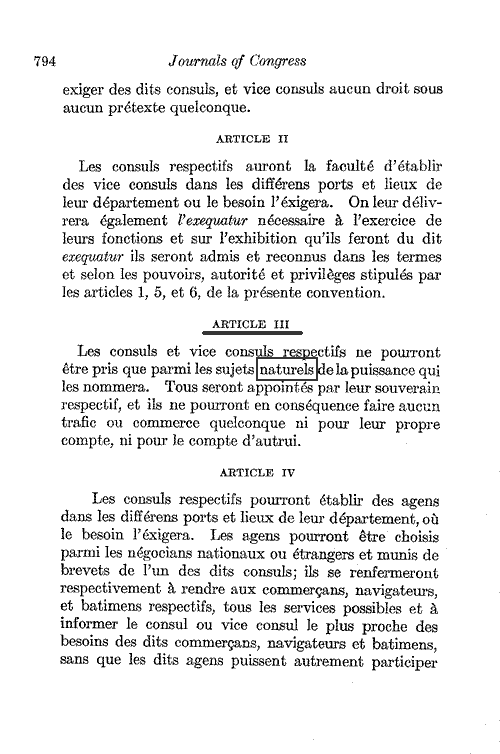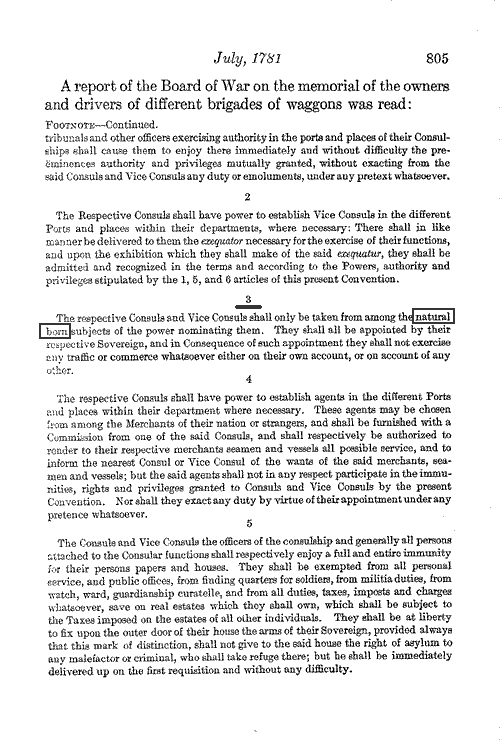“The natives, or indigenes, are those who were born in the country of citizen parents.
A direct translation of:
"naturels"
is not "native"
It's true, the terms were synonymous which is why we see some translations of Law of Nations using "native"
A direct translation of the French word "naturels" is "natural." and you fully know that.
 |
 |
|
This accepted translation of 'naturel' in 1781, predates John Jay's 1787 letter to George Washington by 6 years.
|
|
That was 6 years BEFORE the Constitution.
DURING the Constitution, the initial suggestion is for the POTUS requirement to be a "citizen." The framers, after receiving Jay's letter suggesting "natural born Citizen" take the concept found in Vattel's Law of Nations, which they were openly reading and referencing during the penning of the Constitution itself.
June 18, 1787 - Alexander Hamilton suggests that the requirement be added, as: "No person shall be eligible to the office of President of the United States unless he be now a Citizen of one of the States, or hereafter be born a Citizen of the United States." Works of Alexander Hamilton (page 407).
June 27 1787. IN CONVENTION (Vattel's legal work is read aloud during the Federal Convention) "...that an equal vote in each State was essential to the federal idea, and was founded in justice & freedom, not merely in policy: that tho' the States may give up this right of sovereignty, yet they had not, and ought not:In order to prove that individuals in a State of nature are equally free & independent he [Luther Martin] read passages from Locke, Vattel, Lord Summers -- Priestly. To prove that the case is the same with States till they surrender their equal sovereignty, he [L.M.] read other passages in Locke & Vattel, and also Rutherford:" From Madison's Notes on the Convention.
Similar notes on Vattel being read during the convention can be found in the notes of Rufus King and Robert Yates as well.
July 25, 1787 (~5 weeks later) - John Jay writes a letter to General Washington (president of the Constitutional Convention): "Permit me to hint, whether it would be wise and seasonable to provide a strong check to the admission of Foreigners into the administration of our national Government; and to declare expressly that the Commander in Chief of the American army shall not be given to nor devolve on, any but a natural born Citizen." [the word born is underlined in Jay's letter which signifies the importance of allegiance from birth.]
http://rs6.loc.gov/cgi-bin/query/r?ammem/hlaw:@field%28DOCID+@lit%28fr00379%29%29:
September 2nd, 1787 George Washington pens a letter to John Jay. The last line reads: "I thank you for the hints contained in your letter"
http://www.consource.org/index.asp?bid=582&fid=600&documentid=71483
September 4th, 1787 (~6 weeks after Jay's letter and just 2 days after Washington wrote back to Jay) - The "natural born Citizen" requirement is now found in their drafts. Madison's notes of the Convention
The proposal passed unanimously without debate.
They read Vattels work during the Convention. It gave them a widely known definition for citizens who are natural born.
And no Mr. Rogers, citizens of our Constitutional Republic are not the same as subjects to a crown. The mear thought should be offensive to any citizen of our country today...and would have surely been offensive to those that fought with blood and treasure to throw off their chains of servitude to the crown of England.
Why natural law, Vattel vs English common law, Blackstone:
"The English common law provided that an alien naturalized is “to all intents and purposes a natural born subject.” Co. Litt. 129 (quoted and cited in Rhodes, 27 F.Cass. at 790). With such recognition, a naturalized citizen would have been eligible to be President of the new Republic."
http://puzo1.blogspot.com/2009/08/law-of-nations-and-not-english-common.html
Oh, and I'll take the word of a guy who was ACTUALLY THERE, in the room when they were creating the Constitution:
George Mason, In Convention, Richmond (Debates in the Several State Conventions on the Adoption of the Federal Constitution), Wednesday, June 18, 1788:
"We have it in our power to secure our liberties and happiness on the most unshaken, firm, and permanent basis. We can establish what government we please. But by that paper we are consolidating the United States into one great government, and trusting to constructive security. You will find no such thing in the English government. The common law of England is not the common law of these states."
He refused the sign the Constitution because it lacked a Bill of Rights, which he later is credited as helping to create.
On December 15, 1791, the U.S. Bill of Rights, based primarily on George Mason's Virginia Declaration of Rights, was ratified in response to the agitation of Mason and others.At the convention, Mason was one of the five most frequent speakers. Mason believed in the disestablishment of the church. Mason was a strong anti-federalist who wanted a weak central government, divided into three parts, with little power, leaving the several States with a preponderance of political power. [7]
An important issue for him in the convention was the Bill of Rights. He did not want the United States to be like England. He foresaw sectional strife and feared the power of government.